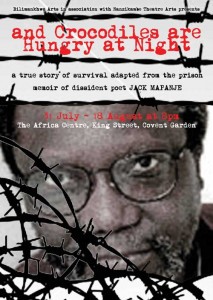 I had no idea that dramatic arts in Malawi had reached this quality. This play was astoundingly awesome. It was extremely well acted, it had great sound effects and they dealt with the tough subject matter in a humorous fashion. If you ever have the opportunity to see this production, grab it with both hands! Description of play from Africa Centre website: Malawi in the 1980s was a dangerous place. People disappeared. Even President Banda’s cabinet were not safe. Banda ordered his Young Pioneers to act against anyone who opposed the president. And Crocodiles Are Hungry At Night is an adaptation of award-winning poet Jack Mapanje’s prison memoir of the same name. In 1987, Jack Mapanje, then a little-known academic, linguist and poet, was imprisoned without charge at Mikuyu prison in Malawi. Despite an international outcry led by Amnesty International and supported by many writers and artists including Wole Soyinka, Harold Pinter and Ronald Harwood, he remained there for 3 years, 7 months, 16 days and more than 12 hours. He was never told why. This is his story. It is a story bursting with hope and humour, and the extraordinary people who survived President Hastings Kamuzu Banda’s attempts to silence his opponents. Living with the threat of death by a ‘car accident’ or being thrown into the crocodile-infested Shire River, Jack Mapanje and his fellow prisoners of conscience survived the dreadful conditions with a spirit of optimism and humanity, which is both uplifting and extraordinary. Everything in this play is true.  And Crocodiles Are Hungry At Night the prison memoir was published last year by Ayebia Clarke publishing, and launched at an event hosted by Amnesty International. The book has created a lot of interest both in Malawi and the UK; Jack Mapanje was recently interviewed alongside Nadine Gordimer on BBC Radio 4’s Start the Week, and the play has been booked for the Shakespeare Birthplace Trust’s poetry festival in July. The play runs for 105 minutes, and plays without an interval.
0 Comments
 We cannot compete on an international platform because: 1. Our pricing is out of kilter 2. We're too bureaucratic PRICING Every time I want to hire a consultant for anything, British prices are always higher than American, Canadian and of course, Asian. On top of that, there's this 20% VAT thing which completely makes a good price look stupid e.g. my email marketing company quoted me £600 and then I get a bill for £720 - wtf? Oh, it's VAT, sorry, we forgot to tell you about that. Like seriously, you didn't think that would be a significant thing to mention in all our discussions? Luckily, I hadn't signed the contract yet - but I did! BUREAUCRACY Businesses need to be willing to negotiate and they need to make decisions fast to compete on an international platform. For instance, when I was selecting a developer for my app, Fat Creep, the British contender would say stuff like "I have a meeting with my partner on that this afternoon". I don't give a monkeys about your meetings, I need a decision now! The Asians would take things away and respond extremely fast. At what level can Britain compete? Primary industry i.e. agriculture etc, we don't have the land and the weather is not amenable to the growth of very much. We cannot compete well here. Secondary industry i.e. manufacturing, America is a developed economy just like Britain but input prices are way lower - how do you explain that? People are able to start making a product so much more easily than you can here. Are the British just too darn greedy? Why can't they cut their pricing to match America? Tertiary industry i.e. services - this is where we should be able to compete! However, I took a brief look at the many resources I now use as an entrepreneur related to technology and they are mostly American!! My email management tool (mailchimp), my webhost (weebly) and all the artists I have hired to do pictures for me. My accountant had to be British but even what he said was a cheap price for his services made me feel a little screwed. I haggled, of course, because my name wouldn't be Heather if I didn't! A successful business, even one with only a single full-time employee depends on so many other suppliers. Every business receipt represents a supplier, I want to use British but I'm sorry, right now they need to jack up - big time!
 This week I watched an irked civilian railing off his displeasure at Boris Johnson writing for the Telegraph and getting paid for it. I think everyone, politicians included are entitled to some time off and they should spend that free time however they choose to. If Boris chooses to write in his free time, so be it. If someone is willing to pay him for it, even better. Why do I say this: He’s not doing it during ‘business’ hours If Boris is sat at his desk in City Hall writing articles I would take issue with that, even if it’s during his ‘lunch’ break. As a public servant it is his duty to serve the public from that office and doing anything else simply would not be right. However, I am reasonably confident that he does not do this. It doesn’t take much time As someone who has always enjoyed writing I know that when one is passionate about an issue you can write about it fluidly and rapidly, it does not take a lot of time. It’s more transparent than other enterprises People frequently take issue with politicians indulging in private enterprise. I too agree that there is only so much time in the day and if you’re in public office you need to rightly spend most of your time on that. Of the private enterprises that a politician might choose to undertake surely writing is one of the most transparent? We the public have access to the writing and can approximate how much time we believe it took Boris to get his feelings down. We get to know Boris’s stance on various issues better Through his writing we get a better feel for how Boris Johnson thinks and hence how suitable a mayoral candidate he is. Everything that Boris does that we can observe is an opportunity for us to vet him, articles included. More tax pounds Let’s trace the income that Boris makes from his column. For argument’s sake let’s call it £10,000 per contribution or about £500,000 per annum.
If the same £500,000 had ended up as operating profit, it would only incur the corporate tax rate of 30%, so just £150,000 would be returned to the taxpayer. I don’t know about you but I prefer the former to the latter. The faster we can wipe out the deficit, the better. In conclusion, provided Boris pays his taxes and doesn’t spend office hours writing his articles, all things considered it’s beneficial to taxpayers and the voting public. Am I missing something here?
|
Archives
December 2015
Categories
All
By Heather Katsonga-WoodwardI'm always thinking, debating, considering and revising my views - some of those deliberations will be shared right here. |




 RSS Feed
RSS Feed
